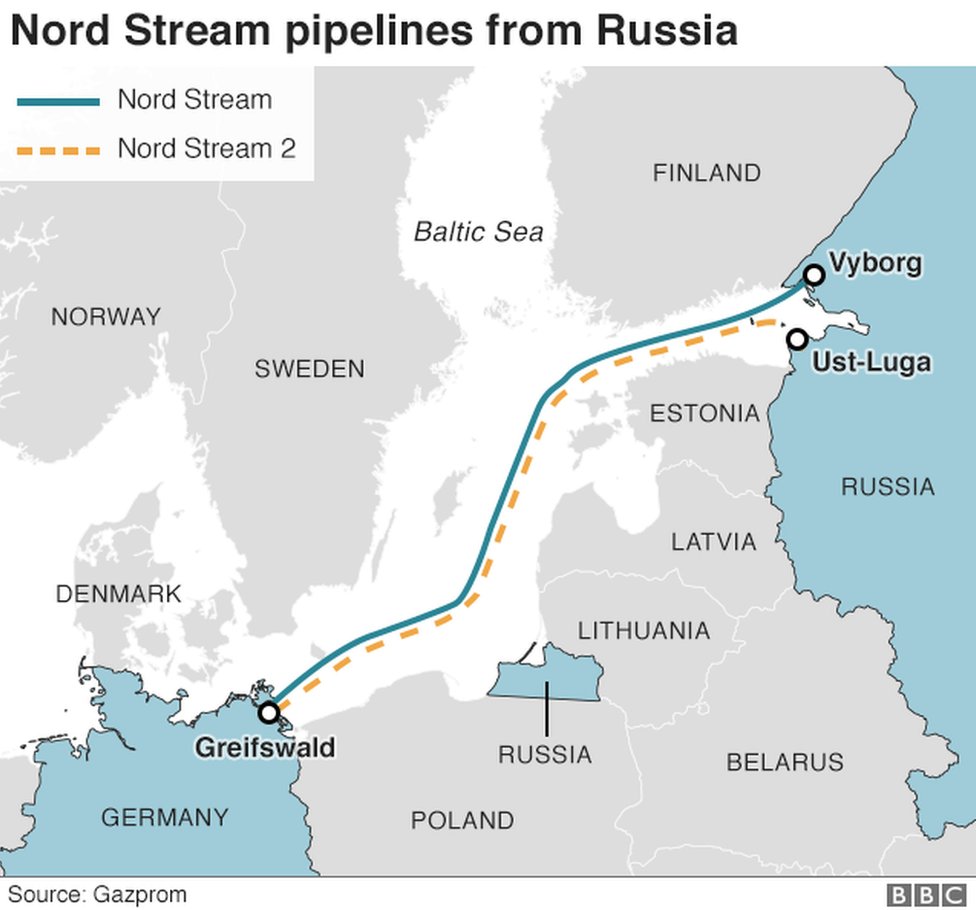
United States and Germany reportedly made a wider deal over the controversial Nord Stream 2 natural gas pipeline. The project, which is 98 percent complete, is expected to have a negative impact on Ukraine, since the Eastern European country could stop playing the role of a regional gas hub.
By Nikola Mikovic
Prior to the “historic” meeting between the US President Joe Biden and his Russian counterpart Vladimir Putin in Switzerland, on June 16, the American leader openly said that Washington will not impose sanctions on companies involved in the construction of the $11 billion project.
In other words, he gave the green light to Russia to finish the pipeline that will provide Germany, and other European countries, with natural gas. Ukraine, as a gas transit country, will be bypassed and could lose up to $3 billion annually, which is the amount Moscow is paying to Kiev for transit fees, according to the contract that expires in 2024.
Nord Stream 2
“For the German government it remains central that Ukraine should remain a transit country even after Nord Stream 2,” a government spokesman, Steffen Seibert, has said.

After the construction of Nord Stream 2 is finished, Germany will have two lines of direct gas supplies from Russia and will not depend on Ukraine in any case whatsoever. Why would Berlin be interested in Ukraine remaining a transit country?
Reading between the lines, Germany promised to the US to obtain from Russia the extension of transit through Ukraine for another 10 years from 2024 to 2034. Both Berlin and Washington will try to ensure that Ukraine continues to receive roughly $3 billion, but they don’t seem to be willing to provide that much money to Kiev.
According to the US – Germany deal, the two countries will endeavor to promote and support investments of at least $1 billion in the Green Fund for Ukraine, while Berlin will provide an initial donation to the fund of at least $175 million and will work toward extending its commitments in the coming budget years.
Moreover, Germany will continue to support bilateral energy projects with Ukraine, especially in the field of renewables and energy efficiency, as well as coal transition support, including the appointment of a special envoy with dedicated funding of $70 million.
Funding Ukraine
All that can hardly compensate Ukraine for the loss of $3 billion annually. Thus, Germany, on behalf of the United States, will try to force Russia to keep funding Ukraine – a country that sees Moscow as its major enemy.
At this point, it does not seem very probable that the Kremlin will agree to expand the gas contract with Ukraine, although that issue will undoubtedly be another bargain chip in relations between Russia and the West.
Theoretically, Moscow can say that pipelines running through Ukraine are too old and in a very bad condition, which means that someone would have to pay for their reconstruction. Ukraine could get loans from the West, or even from China, to renew its worn-out pipelines. But in that case, it will likely be foreign powers, rather than the Ukrainian state, that will own the nation’s energy infrastructure.
Russia, for its part, is expecting to keep playing to role of a “gas station masquerading as a country”. If Moscow agrees to keep using Ukraine as a transit country for its gas supplies to Europe, Russoa will de facto capitulate to its Western partners’ demands. Naturally, the Kremlin could portray that as another Putin’s geopolitical victory.
The Russian leader recently wrote an article entitled “On the Historical Unity of Russians and Ukrainians”, claiming that “Russia will never be anti-Ukraine”, and that “true sovereignty of Ukraine is possible only in partnership with Russia”.
“If economic ties between our countries had been retained, Ukraine would enjoy the benefit of tens of billions of dollars”, Putin wrote.
Even without retained economic ties with Ukraine, Russia – pressured by the West – could eventually find a way to keep providing $3 billion to “the brotherly Ukrainian people” in order to prevent it from “freezing to death”.
someone will have to keep funding what Putin in his piece called “the anti-Russia project”, indeed. From the Western perspective, it would be the cheapest and the most efficient option if Moscow would do that. But will it?
Nikola Mikovic is a Serbian journalist and a senior Geopolitical Analyst he publishes often for The Levant News.






After US attempts to sneakily destabilize the area!! Didn't manage to get the terrorist hordes in there either.